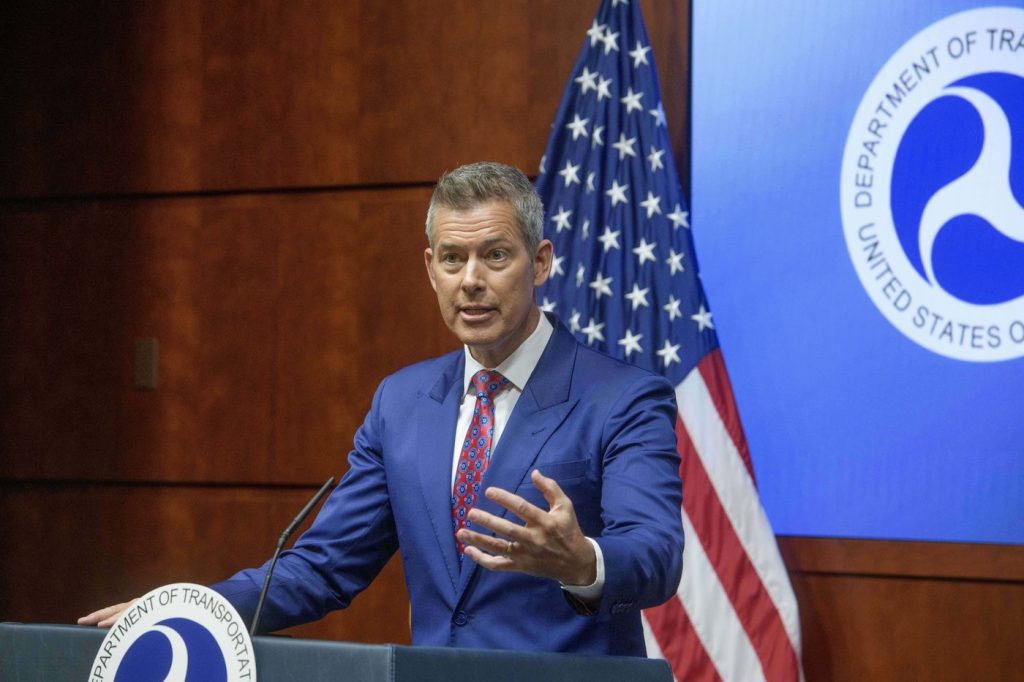BOSTON (AP) — A federal judge in Rhode Island has issued a temporary injunction against the Trump administration's attempt to withhold billions of dollars in transportation funding from states that do not comply with certain immigration enforcement actions. This legal decision stems from a lawsuit filed by twenty states, which argued that Transportation Secretary Sean Duffy had threatened to cut off critical federal funding unless states adhered to the administration's immigration policies.
U.S. District Judge John McConnell Jr. ruled that the states have sufficiently demonstrated the potential for "irreparable and continuing harm" if forced to accept what he termed "unlawful and unconstitutional immigration conditions" in order to obtain federal transportation grants. Judge McConnell noted the serious implications of the funding threat, citing the risk of losing billions in federal funding, compromising the autonomy of local law enforcement, and eroding trust between law enforcement and immigrant communities. Furthermore, he indicated that states might be required to alter, postpone, or cancel ongoing transportation projects as a result of the pressure to comply with federal immigration directives.
Massachusetts Attorney General Andrea Campbell expressed her approval of the ruling, stating that the temporary order protects critical funding for transportation in Massachusetts and that the attempt to condition federal funds on compliance with immigration policy was both "wrong and illegal." Her comments, made via a statement on social media platform Bluesky, underscored the importance of the ruling for state budgets and infrastructure development.
Responding to the ruling, Transportation Secretary Sean Duffy issued a statement on X, portraying the decision as an example of judicial overreach. He emphasized that he had instructed states seeking federal Department of Transportation (DOT) funding to comply with existing federal immigration laws. Duffy characterized the ruling as a product of "judicial activism" by an "Obama-appointed judge," indicating his intention to continue challenging the decision in court.
The controversy began when states received notifications from the Department of Transportation on April 24, warning that they must cooperate with immigration enforcement in order to secure federal funds allocated by Congress. Although no immediate funding was withheld, states expressed concern that such actions could occur swiftly.
The coalition of attorneys general from California, Colorado, Connecticut, Delaware, Hawaii, Illinois, Maine, Maryland, Massachusetts, Michigan, Minnesota, Nevada, New Jersey, New Mexico, New York, Oregon, Rhode Island, Washington, Wisconsin, and Vermont filed the lawsuit in May. They claimed that compliance with the so-called "Duffy Directive" would place them in an untenable situation: either they comply with illegal conditions, compromising their own law enforcement autonomy, or they face the forfeiture of significant federal funding essential for maintaining infrastructure such as roads, highways, railways, airways, ferries, and bridges.
On the other hand, acting Rhode Island U.S. Attorney Sara Miron Bloom argued in court that Congress has authorized the Department of Transportation to establish conditions for the allocation of grant money to states. She asserted that requiring state compliance with federal law enforcement is a legitimate exercise of this authority. Bloom contended that allowing the federal government to withhold funds while the lawsuit progresses would not cause lasting harm since the funds could always be distributed later if deemed necessary.
However, she maintained that mandating the release of funds to states resisting cooperation would likely make any potential recoupment impossible should the Department of Transportation prevail in the case. This ongoing legal battle underscores the complex intersection of state and federal authority, particularly regarding immigration enforcement and funding for crucial public infrastructure.












